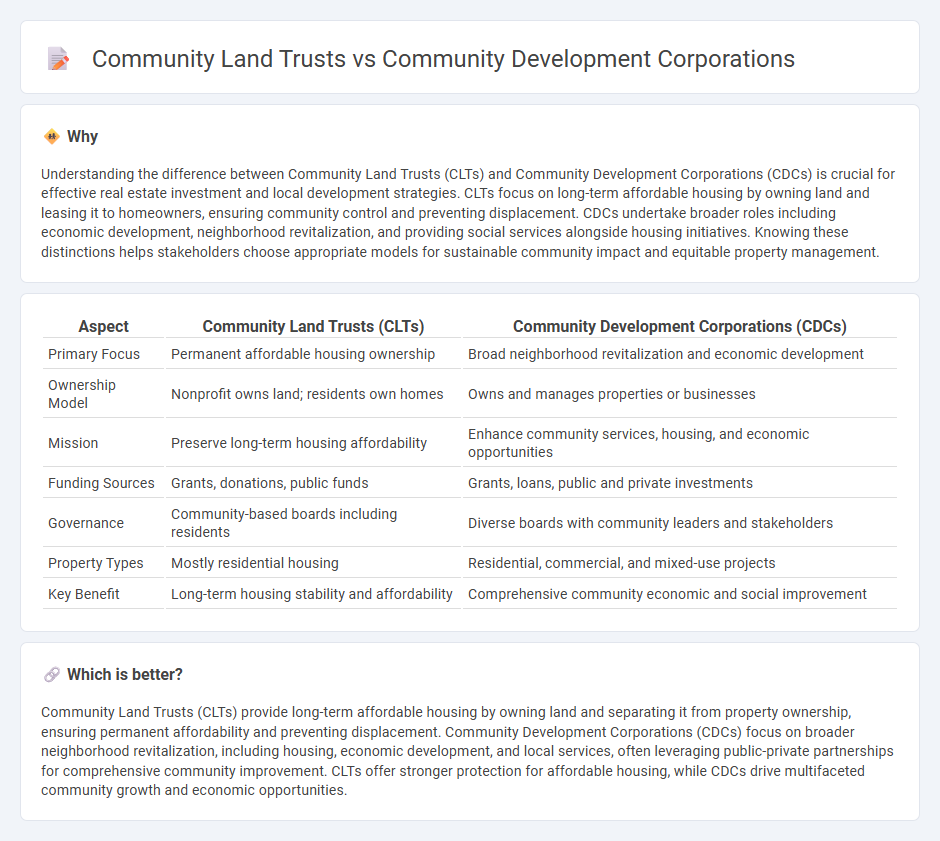
Community land trusts (CLTs) focus on acquiring and managing land to ensure long-term affordable housing by separating land ownership from housing ownership. Community development corporations (CDCs) engage in broader economic development efforts, including housing, commercial projects, and social services to revitalize neighborhoods. Explore the unique roles and benefits of CLTs and CDCs in sustainable community development.
Why it is important
Understanding the difference between Community Land Trusts (CLTs) and Community Development Corporations (CDCs) is crucial for effective real estate investment and local development strategies. CLTs focus on long-term affordable housing by owning land and leasing it to homeowners, ensuring community control and preventing displacement. CDCs undertake broader roles including economic development, neighborhood revitalization, and providing social services alongside housing initiatives. Knowing these distinctions helps stakeholders choose appropriate models for sustainable community impact and equitable property management.
Comparison Table
| Aspect | Community Land Trusts (CLTs) | Community Development Corporations (CDCs) |
|---|---|---|
| Primary Focus | Permanent affordable housing ownership | Broad neighborhood revitalization and economic development |
| Ownership Model | Nonprofit owns land; residents own homes | Owns and manages properties or businesses |
| Mission | Preserve long-term housing affordability | Enhance community services, housing, and economic opportunities |
| Funding Sources | Grants, donations, public funds | Grants, loans, public and private investments |
| Governance | Community-based boards including residents | Diverse boards with community leaders and stakeholders |
| Property Types | Mostly residential housing | Residential, commercial, and mixed-use projects |
| Key Benefit | Long-term housing stability and affordability | Comprehensive community economic and social improvement |
Which is better?
Community Land Trusts (CLTs) provide long-term affordable housing by owning land and separating it from property ownership, ensuring permanent affordability and preventing displacement. Community Development Corporations (CDCs) focus on broader neighborhood revitalization, including housing, economic development, and local services, often leveraging public-private partnerships for comprehensive community improvement. CLTs offer stronger protection for affordable housing, while CDCs drive multifaceted community growth and economic opportunities.
Connection
Community land trusts (CLTs) and Community Development Corporations (CDCs) collaborate to promote affordable housing and equitable neighborhood revitalization. CLTs secure land ownership to ensure long-term housing affordability, while CDCs drive local economic development and infrastructure improvements. Their partnership strengthens community control over land and resources, fostering sustainable urban growth and resident empowerment.
Key Terms
Ownership Structure
Community development corporations (CDCs) are nonprofit organizations that focus on economic development, housing, and community services, typically owning and managing assets on behalf of the community with board members representing local residents. Community land trusts (CLTs) separate land ownership from housing ownership by holding land in trust while allowing individuals to own or lease homes, ensuring long-term affordability and community control. Explore how these distinct ownership structures impact sustainability and community empowerment for deeper insights.
Affordability Mechanisms
Community development corporations (CDCs) focus on revitalizing neighborhoods through affordable housing projects, local business support, and social services, leveraging grants and public funding to maintain affordability. Community land trusts (CLTs) specialize in preserving long-term housing affordability by owning land and leasing it to homeowners, preventing speculative market pressures and stabilizing housing costs in perpetuity. Explore how these models uniquely implement affordability mechanisms to promote sustainable community growth.
Community Control
Community development corporations (CDCs) and community land trusts (CLTs) both prioritize community control but operate through distinct mechanisms; CDCs focus on broad economic and social development projects, often managing housing, businesses, and services within a community. CLTs emphasize land ownership stewardship by holding land in trust to ensure long-term affordable housing and prevent displacement, securing permanent community control over land assets. Explore how these models uniquely empower communities by balancing development goals with sustainable control.
Source and External Links
Community development corporation - A CDC is a nonprofit organization focused on promoting community development, often in lower-income areas, through activities like affordable housing, economic development, education, and community organizing.
Community Development Corporations Working with For- ... - CDCs are grassroots, neighborhood-based nonprofits aiming to improve local economies, physical environments, and social bonds by creating affordable housing, supporting businesses, and fostering job creation.
Defining Community Development in Order to Fund It - CDCs originated from grassroots efforts addressing disinvestment and racial discrimination, evolving into structured nonprofits supporting housing, job training, and community-building services.
 dowidth.com
dowidth.com